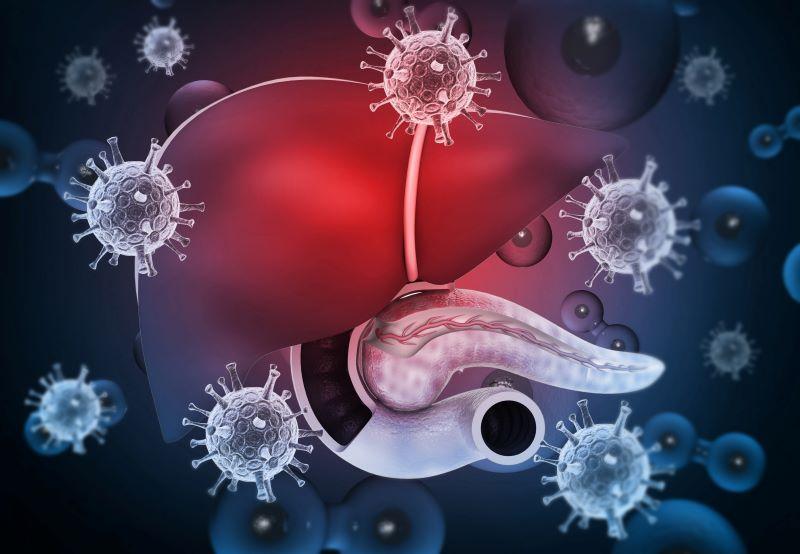Manténgase sano!

- Kirstie Ganobsik
- Posted June 14, 2023
How Do You Get Hepatitis C? Here's What to Know
Hepatitis C is a viral infection of the liver no one wants to catch, so knowing how that can happen can be critical.
The American Liver Foundation estimates that it affects about 2.7 million people in the United States today.
To help you protect yourself against this virus, liver experts describe how you get hepatitis C, if it's curable and how contagious it is. They will also explain if there's a hepatitis C vaccine, and what medications are used to treat this viral infection.
How do you get hepatitis C?
According to the U.S. Centers for Disease Control and Prevention, hepatitis C transmission occurs when you come into contact with the blood of someone who is infected. This can happen through:
- Sharing of drug needles or other injection materials
- Birth: approximately 6% of children born to infected mothers are also infected
- Tattoos and piercings, especially from unlicensed and unregulated establishments
- Sex with someone infected with the virus, which is reported more among men who have sex with other men
- Sharing medical and other items, such as glucose monitors and razors that have infected blood on them
- Health care worker exposure to blood-borne infections
- Organ transplants and blood transfusions
"Before 1993, a blood transfusion was a common way to get hepatitis C, but now blood transfusion is safe because we check the blood,"explained Dr. Melissa Jenkins, chief of the division of infectious diseases at MetroHealth, in Cleveland, Ohio.
A research article published recently in the journal Pathogens noted that the opioid epidemic and less access to health care have also fueled new hepatitis C cases. Incidents of hepatitis C infections increased by 15% between 2019 and 2020 for acute cases, according to the CDC.
Is hepatitis C contagious?
The New York State Department of Health says that hepatitis C is typically contagious for at least a week or more before symptoms appear, and remains so "indefinitely"afterward for people with chronic hepatitis. Anyone who tests positive for the virus is considered contagious.
Dr. Nancy Reau, hepatology section chief at Rush University Medical Center in Chicago, explained in an American Liver Foundation video that "everyday contact to someone with hepatitis C very, very rarely will lead to infection. So, you should not be afraid of your relatives or loved ones who have hepatitis C."
But, Reau added, "Just be careful with anything that might have been exposed to someone else's blood or body products."
Is hepatitis C curable?
The CDC says the cure rate is over 90% for anyone who is treated for hepatitis C with antiviral medications.
"For people who are treated, we check a hepatitis C level 12 weeks or more after the last dose of medicine," Jenkins explained. "If the hepatitis C virus level [viral load] is negative, also known as undetectable, then the patient has a sustained virologic response [SVR]. This is considered a cure."
She added that "people who have cirrhosis prior to treatment still need to see a liver doctor because they are still at risk for liver cancer or complications of cirrhosis, but the risk is much lower after the hepatitis C is gone."
Is there a hepatitis C vaccine?
There is no hepatitis C vaccine. According to the Pathogens article, the virus has the genetic ability to make various mutations that are somewhat different from each other, making it challenging to develop an effective vaccine.
The American Liver Foundation notes that hepatitis C symptoms don't often show up until after liver damage has already occurred. In fact, up to 75% of people with the virus don't know they have it. About 75% to 85% of people who are infected will end up with chronic hepatitis C.
"If left untreated, hepatitis C can lead to cirrhosis of the liver and liver cancer,"Jenkins said. "Once cirrhosis develops, it is irreversible."
That's why the CDC recommends getting a hepatitis C blood test once when you turn 18, and on a regular basis if you have certain risk factors for getting the virus. This helps ensure that treatment can start as soon as possible.
"For the last decade, we have had incredibly easy-to-use all-pill therapy [for hepatitis],"Reau explained. "So, the medications are given for between 8 weeks and 12 weeks for almost everybody. They have cure rates of nearly 100% "¦ the medications are incredibly safe and very well-tolerated."
SOURCE: Melissa Jenkins, MD, chief, division of infectious diseases, MetroHealth, Cleveland, Ohio





